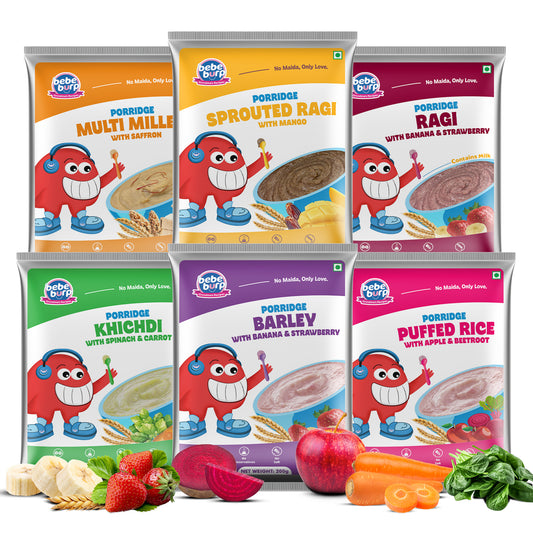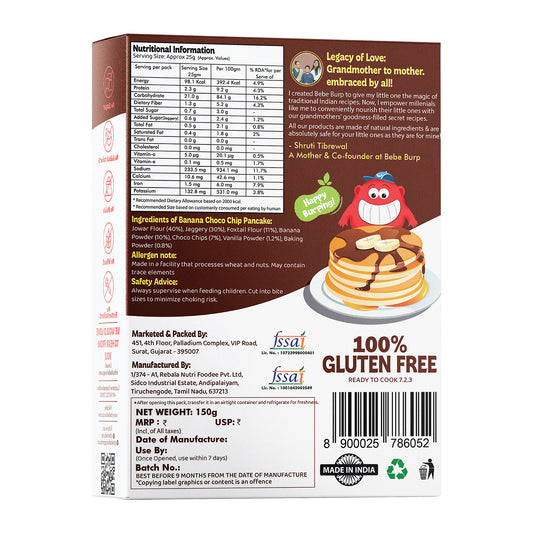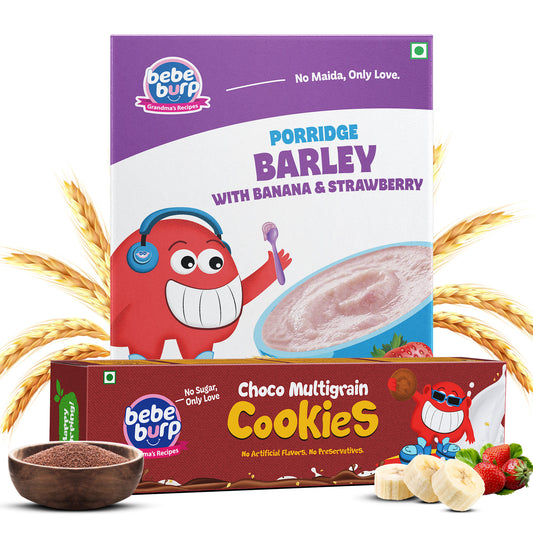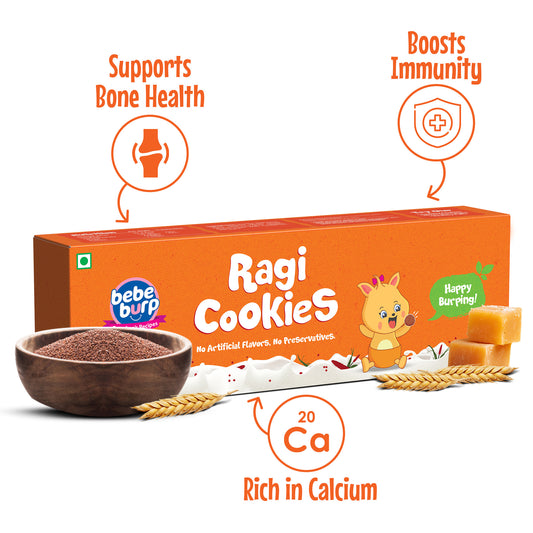The best way to naturally increase your baby's appetite is to follow the steps that include serving meals regularly, a diverse range of products of different textures and flavors, and removing any stress about them and turning them into an enjoyable activity.
Cater to small nutritious portions, make your baby active during the day time and make them eat without pressing. Such easy and regular habits will trigger hunger and they will facilitate healthy development.
Why Is My Baby’s Appetite Low?
Have you observed your small one all of a sudden really taking in less? It is not so unusual, and do not panic! The appetite of a young kid may decline due to a number of reasons that are not harmful. The most popular ones are:
-
Teething Troubles – Sore gums can make eating uncomfortable.
-
Mild Illness – A cold, fever, or tummy bug can temporarily reduce hunger.
-
Natural Growth Slowdown – After the first year, growth slows and so does appetite.
-
Constipation – A backed-up tummy often means no room or desire for food.
-
Too Many Snacks or Milk – Constant grazing or too much milk can spoil main meals.
- New Surroundings or Routines – Travel, visitors, or changes at home can affect eating.
Parent Tip: Lack of appetite normally lasts only a short period. Continue to provide healthy food without any forcing and rely on the feedback of your baby.
In case of the persistence of the low-appetite, as well as weight loss, consult your pediatrician.
Natural Ways to Boost Your Baby’s Appetite
Concerned that your baby is not eating enough? Blackjack usually loses its appetite through stressful things and exercises trying these natural, mild steps to restore their appetite.
Establish a Consistent Feeding Schedule
Newborns live on a schedule. Meal and snack time should also be at constant periods in a day and this way their body can learn when to expect food. They must not engage in spontaneous snacks, which can make them full ahead of time.
Introduce a Variety of Flavors and Textures
Provide various flavors sweet, savory and mild spices and food of varied textures, such as mashed, lumpy or soft finger foods. This makes it interesting and inquisitive about food.
Create a Positive Mealtime Environment
Make eating times quiet and cheerful. Enjoy time with each other, sitting face-to-face and screen-free and direct your attention at the connection. The feeling of safety and relaxation is more likely to make babies eat.
Offer Nutrient-Dense Foods
Select foods that have oomph in each bite-avocido, banana, lentils, sweet potatoes, and ghee are some of the foods which offer a solid linchpin to every bite. These feed even when your baby consumes a little.
Make Meals Visually Appealing and Interactive
Make eating a small adventure! The plates need to be colored, fun shapes such as cookie cutters on fruits or sandwiches, or allow your baby to self-feed. It makes feeding rather than fussy.
What Fruits Are Good for Appetites?
There are fruits that are also thought to increase appetite and provide healthy digestion in the body. These are the best choices towards being baby-friendly:
Banana
Full of energy and easily digested, bananas may fill the little tummies without any drastic attempts at stimulating hunger about the next time the little one will eat something.
Apple
Apples (with stewed or pureed being the best) are amazing digestatives and have forms of fiber which rhythmize the cycle of appetite.
Orange
Citrus fruits such as oranges and sweet lime enhance the digestion process and will stimulate saliva production, both of which can stimulate the feeling of hunger. (Introduced at 910 months.)
Grapes
A sweet hydrating snack good source of antioxidants and natural sugars, grapes are the food that will make you feel fantastic because it increases the energy levels and hunger without excessive stimulation. Peel and chop and serve.)
Mango
An ample source of nutritive elements, especially vitamin A, and digestive enzymes; it is a natural appetite food in summer.
Pineapple
Pineapple contains enzymes such as bromelain which enhance the digestive process and probably arouse our appetite. (NB: Offer moderately after 1 year because it is acidic.)
Pro Tip: Whenever giving fruit, always cut it up, serve it soft, peeled and into safe-to-eat pieces. And they should give fruits so as not immediately before other meals and so leave room for main meals!
How to Feed a Baby Who Doesn’t Want to Eat?
The meal hour has revolted into fighting? You are not alone, your baby is not the only baby who is having this little phase of not wanting to be fed. These are calm, clever ways to make baby eat better instead of stressing about it:
Stay Calm and Positive
Never force-feed and do not be frustrated. A calm and happy atmosphere makes your baby feel safe and more open to attempt food.
Follow a Consistent Feeding Routine
Provide foods and snacks in the same schedule every day. Do not give too much milk or any snacks between meals-it kills their feeding.
Make Food Fun and Interesting
Foods with bright color, humorous figurines, and finger food that babies can eat. Let them go on exploring and playing, it develops curiosity and confidence.
Let Baby Lead Sometimes
Provide some spoon feeding and some self feeding. There are children who like to do things their way, this is because some babies like independence and can feed better when on their terms.
Eat Together as a Family
Babies imitate very well. By watching you have a good time with food, they may tend to do what you are doing.
Start Small, Go Slow
Offer small portions to avoid overwhelming them. Celebrate even a few bites—they add up!
Remember: No two babies are the same. Follow their signals and in case of denial, which increases over time, discuss it with your pediatrician.
The Importance of Proper Nutrition for Infant Growth
Nutrition drives bone strength to the brain development. A baby who is well fed will:
- Achievement of developmental milestones
- Do not have weak immunity
- Sleep better
- Healthy weight gain at such an age is maintained
A healthy diet that is iron, calcium, and healthy fat- and vitamin-rich ensures a long life of good health.
When to Consult a Doctor
ordinary fluctuations in appetite decrease, but when you experience the following symptoms you should also consult a specialist:
-
Your baby shows no interest in eating for days
-
There’s significant weight loss or poor weight gain
-
You notice lethargy, frequent vomiting, or diarrhea
- Feeding issues are causing parental stress or mealtime anxiety
Your pediatrician may suggest blood tests, feeding evaluations, or rule out conditions like reflux or oral motor delays.
Conclusion
Babies do not develop appetite easily and it requires time, ingenuity and patience. Practice healthy ways such as routine, variety and high nutrient foods.
Keep track of the progress, reward yourself with little victories, and never ignore the signals of your infant. In case of weakness, professional assistance is no more than a consult away.
FAQs
Q1) How to increase appetite in babies naturally?
Ans: Maintain a routine of eating and exposure to different flavors and meals, give foods that are very nutritious like avocados and lentils and make the food environment relaxed.
Q2) How can I improve my baby's eating?
Ans:Turn meal times into a pleasant experience, free of coercion, allow them to feed themselves and use meals as incentive rewards after active play. Repetition foods even when the first one is rejected.
Q3) When should I worry about my baby’s appetite?
Ans: It is necessary to consult a pediatrician when your child refuses to eat and undertakes repeated refusals, or when weight gain is lost or appears inappropriately weak or fussy.
Q4) Can certain foods or spices help boost appetite?
Ans: Yes! Using mild spices like jeera (cumin) or ajwain (carom seeds), in an extremely small quantity, and fruit like papaya or mango can be used to stimulate appetite.
Head over to our homemade baby food and nutritious snacks which are made to suit babies aged 6 months and older.











